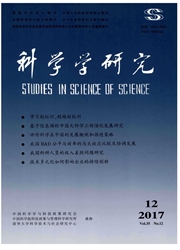

 中文摘要:
中文摘要:
科技人才的收入满意度问题已成为政府管理部门和学术界普遍关注的焦点。本文以浙江省11地区的2019名科技人才为研究样本,运用均值比较、logit回归分析等方法,在区分高校、科研院所和企业单位的基础上,实证检验了不同人口背景特征、制度性因素对科技人才收入满意度的影响。研究发现:(1)总体表明,科技人才对自身收入水平的评价偏低;(2)高校、科研院所与企业中科技人才的人口背景特征因素、及其对专业技术职称、职务评定制度与科技成果评价奖励制度的评价具有显著的差异性;(3)人口背景特征变量与两类制度性因素在高校、科研院所与企业中所起的影响作用的力度与影响方向受单位性质所调节,其中,在三类单位中,科技成果评价奖励制度对收入满意度均具有显著的正向影响,并且影响力度最大。最后,根据实证结果,提出了提高科技人才收入满意度的对策与建议。
 英文摘要:
英文摘要:
The income satisfaction of scientific and technological talents has gained the widespread focus of the government sector and academia field.Using the 2019 scientific and technological talents of 11 districts in Zhejiang Province as the sample,and through the mean comparison,logit regression analysis and other methods,the paper examines the effect of background characteristics and institutional factors on the of scientific and technological personnel income satisfaction on the basis of the distinction between universities,research institutes and enterprises.The study finds that: firstly,in general,the evaluation of scientific and technological talents of their own income levels are low;secondly,universities,research institutes and enterprises has significant differences in scientific and technological personnel background characteristics,and professional titles,level evaluation system and the scientific and technological achievements evaluation and incentive system;thirdly,the intensity and the direction of influence of the background characteristic variables and institutional factors on income satisfaction is moderated by the role of universities,research institutes and enterprises,and in the three types of units,income satisfaction has a significant positive impact,and with the largest impact on income satisfaction.Finally,based on empirical results,this paper puts forward countermeasures and suggestions to improve the income satisfaction of scientific and technological personnel.
 同期刊论文项目
同期刊论文项目
 同项目期刊论文
同项目期刊论文
 期刊信息
期刊信息
